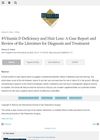1 citations,
November 2022 in “International journal of trichology” A woman's premature gray hair turned mostly black again after using Greyverse solution and hair supplements for 5 months.
 1 citations,
March 2022 in “IntechOpen eBooks”
1 citations,
March 2022 in “IntechOpen eBooks” Collagen is crucial for health and treating certain diseases, and supplements can improve skin, nails, and hair conditions.
 1 citations,
March 2020 in “QJM: An International Journal of Medicine”
1 citations,
March 2020 in “QJM: An International Journal of Medicine” Lactoferrin levels are lower in people with chronic hair shedding, suggesting supplements could help treat it.
 May 2024 in “Portuguese journal of dermatology and venereology”
May 2024 in “Portuguese journal of dermatology and venereology” Reassurance and counseling are key in managing acute telogen effluvium, with supplements possibly offering a placebo effect.
 March 2024 in “Journal of animal science/Journal of animal science ... and ASAS reference compendium”
March 2024 in “Journal of animal science/Journal of animal science ... and ASAS reference compendium” Soy hull supplement does not affect sheep and lamb growth or reproductive performance compared to corn-based supplements.
 January 2024 in “Biotechnology advances”
January 2024 in “Biotechnology advances” Bioassays help find useful compounds in nature for making medicines, supplements, and cosmetics.

Problems with arginine processing in hair follicles might contribute to common hair loss, and arginine supplements could help treat it.
 December 2022 in “Journal of Education, Health and Sport”
December 2022 in “Journal of Education, Health and Sport” COVID-19 can cause hair loss, often treated effectively with a combination of supplements and topical treatments.
 July 2022 in “Hair transplant forum international”
July 2022 in “Hair transplant forum international” Vitamin D might be involved in hair growth, so taking supplements could help treat hair loss if you're deficient.
 June 2022 in “International Journal of Advanced Research in Science, Communication and Technology”
June 2022 in “International Journal of Advanced Research in Science, Communication and Technology” Multivitamin gummies with various vitamins and minerals offer a tasty and easy-to-digest alternative to traditional supplements.
 July 2021 in “Clinical Medicine”
July 2021 in “Clinical Medicine” Iron deficiency without anemia can cause itching and other skin-related symptoms, and iron supplements may help.
 January 2020 in “Asian journal of applied science and technology”
January 2020 in “Asian journal of applied science and technology” Good nutrition is crucial for health and preventing disease, and supplements can help prevent nutrient deficiencies.
 August 2018 in “Journal of The American Academy of Dermatology”
August 2018 in “Journal of The American Academy of Dermatology” People with telogen effluvium and scalp discomfort might have low vitamin B12 and could benefit from B12 supplements.
 July 2018 in “International journal of clinical & experimental dermatology”
July 2018 in “International journal of clinical & experimental dermatology” Eat a balanced diet for healthy hair; only use supplements if you have a proven nutrient deficiency.
 August 2016 in “Journal of Investigative Dermatology”
August 2016 in “Journal of Investigative Dermatology” Zinc deficiency disrupts hair growth and cycle, but zinc supplements can fix this.

A boy on a ketogenic diet and anti-epileptic drugs developed skin issues due to stopping vitamin supplements, which improved with proper supplementation.
 April 2016 in “Journal of The American Academy of Dermatology”
April 2016 in “Journal of The American Academy of Dermatology” People with hair loss have low zinc levels; zinc supplements and laser therapy may help.
 73 citations,
January 2013 in “Annals of Dermatology”
73 citations,
January 2013 in “Annals of Dermatology” People with hair loss, especially those with certain types, have lower zinc levels, and zinc supplements might help.
73 citations,
October 2001 in “Epilepsia” Children taking higher doses of valproic acid had lower biotinidase activity, which may lead to biotin deficiency, but biotin supplements could help.
 66 citations,
June 2018 in “British Journal of Dermatology”
66 citations,
June 2018 in “British Journal of Dermatology” European guidelines recommend regular eye and ear exams, skin care, vitamin D supplements, and cautious use of medications for managing congenital ichthyoses.
 63 citations,
May 2017 in “American Journal of Clinical Dermatology”
63 citations,
May 2017 in “American Journal of Clinical Dermatology” People with alopecia areata often have lower levels of vitamin D, zinc, and folate, but more research is needed to understand if supplements can help treat it.
 19 citations,
January 2019 in “International Journal of Trichology”
19 citations,
January 2019 in “International Journal of Trichology” Indian dermatologists recommend treating common hair loss with a balanced diet, stress reduction, mild shampoos, and sometimes minoxidil and supplements.
16 citations,
January 2010 in “Journal of Korean medical science/Journal of Korean Medical Science” A Korean boy's skin and digestive symptoms were caused by a rare genetic disorder that affects zinc absorption, and he got better with zinc supplements.
 14 citations,
June 2016 in “Pediatric Dermatology”
14 citations,
June 2016 in “Pediatric Dermatology” Some congenital hair disorders improve with age and can be managed with treatments like minoxidil, retinoids, supplements, and gentle hair care, but there's no cure.
 7 citations,
May 2016 in “SpringerPlus”
7 citations,
May 2016 in “SpringerPlus” Some breast cancer patients on hormone therapy experience hair loss, and treatments like certain topical inhibitors and supplements may help without harming their cancer prognosis.
 3 citations,
November 2020 in “Biological Trace Element Research”
3 citations,
November 2020 in “Biological Trace Element Research” Men with hair loss may lack zinc, copper, and vitamin D; supplements could help.
 3 citations,
November 1999 in “Journal of Cutaneous Medicine and Surgery”
3 citations,
November 1999 in “Journal of Cutaneous Medicine and Surgery” AGA is a genetic, hormonal hair loss treated with finasteride, minoxidil, and supplements, but new compounds are being developed.
 2 citations,
August 2022 in “Clinical Case Reports”
2 citations,
August 2022 in “Clinical Case Reports” A 17-year-old girl had severe, on-and-off hair loss, likely due to COVID-19. She was treated with Vitamin D3, biotin, and other supplements, and saw some improvement within a month.
 2 citations,
July 1998 in “Dermatologic Clinics”
2 citations,
July 1998 in “Dermatologic Clinics” European dermatologic treatments focus on lifestyle and psychosocial factors, use diverse methods like baths and climate therapy, and emphasize the importance of diet and supplements for skin health.
 1 citations,
November 2022 in “World Family Medicine Journal /Middle East Journal of Family Medicine”
1 citations,
November 2022 in “World Family Medicine Journal /Middle East Journal of Family Medicine” People in Jeddah know about Vitamin D and its sources but are unclear on how much they need daily, and while many women take supplements, attitudes towards increasing Vitamin D levels vary.


























